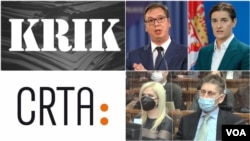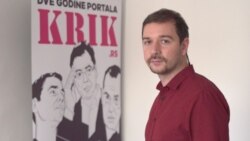Serbia has been criticized for not doing enough to condemn or put an end to smear campaigns against media and civil society organizations.
In a letter to Serbia’s president and prime minister, the Media Freedom Rapid Response group — a coalition that monitors press freedom violations in Europe — said that instead of publicly condemning a campaign against the independent news outlet KRIK and a nongovernment organization, some members of Serbia’s ruling party had joined in the attacks.
The letter comes after several pro-government media ran reports in March claiming that KRIK and its editor-in-chief, Stevan Dojcinovic, had ties to the suspected leader of a criminal network. A claim the outlet denies. Similar accusations were made about the Center for Research, Transparency and Accountability (CRTA), an independent organization set up to promote democracy and civil activism.
“These campaigns are extremely dangerous. They are intended to silence anyone who is perceived as a critic of the Serbian government,” said Patrick Butler, vice president of content and community at the International Center for Journalists (ICFJ).
The allegations reported by pro-government media were repeated by Aleksandar Martinovic, a member of the Serbian Progressive Party (SNS), in the National Assembly on March 17.
“They get the money from abroad and spend it partly here. What they fail to spend on expensive cars, apartments, suits, mobile phones, fake projects which have never been completed — they take out of the country,” said Martinovic. "They are not nongovernmental organizations. Let's not fool ourselves, they are criminal organizations."
Butler said such comments and attempts to discredit groups or media organizations jeopardize the targets in multiple ways.
“They are dangerous to the people who work at KRIK and at CRTA. By falsely linking Stevan Dojcinovic to an organized crime network, for example, the government and its allies are putting him and his colleagues at extreme risk,” Butler said.
“In a country where so much of the media and other institutions are under government control, the people need trusted, independent media and civil society organizations to hold the government to account,” said Butler, whose organization awarded Dojcinovic the Knight International Journalism award in 2019.
The European Parliament has also condemned the “abusive language, intimidation and slandering campaigns” that seek to portray KRIK and others as being associated with criminal groups.
In its resolution on Serbia adopted last week, the parliament said it was “appalled by the recent orchestrated attacks carried out by several MPs and pro-government tabloids,” and said such action represents a “breach of democratic practice.”
President Aleksandar Vucic has called on members of his SNS party to stop attacking KRIK. “Tell [reporters], ‘you are fabricating,’ ‘you are not telling the truth,’ ‘you are hypocritical,’ but no one has the right to threaten journalists,” he said in an interview on state TV.
Maja Gojković, the Serbian Minister of Culture and Information, also called for an end to the attacks. "The rhetoric that has been used to address to journalists in recent days is not appropriate for serious actors on the political scene,” the ministry said in a statement, without specifying any incident or media organization.
Michael Martens, who covers Serbia and reports for the German Frankfurter Allgemeine Zeitung, told VOA Serbian he believes those who make accusations without proof should be held to account.
“It is OK for politicians to criticize journalists for their work or opinions, but it is not OK to accuse them of connections to organized crime without any proof. Politicians who do that should be held accountable for libel, and their governments or party should discipline them,” said Martens, who reports on links between politics, sports and organized crime.
Lydia Gall, a senior researcher at Human Rights Watch, said that smear campaigns by high-ranking public officials send clear signals.
“That this type of behavior is not only endorsed, but to a certain [degree] encouraged, … is particularly unacceptable and dangerous to those in the line of fire,” Gall told VOA Serbian.
Instead of “smearing and demonizing” journalists, authorities should focus on allowing “watchdogs to do their work without government interference,” Gall said.
The Media Freedom Rapid Response group has called for “a full-throated, high-level condemnation of the smear campaign against KRIK and other independent outlets in Serbia” and for authorities to take “all necessary steps to stop and sanction these discrediting tactics.”
Jelena Sesar, a researcher on the Balkans and EU for Amnesty international — one of the signatories of the letter — said that countries with a strong tradition of civil liberties tend to protect the right to freedom of expression.
“Public officials in such countries refrain from engaging in unfounded smear campaigns against media outlets and journalists and ensure that their actions do not inspire violations of freedom of expression or media freedom,” Sesar told VOA Serbian. “The officials tend to be quick to condemn any acts of repression and send a clear signal that attacks against journalists will not be tolerated.”
The Media Freedom Rapid Response also warned that publishing baseless claims against an outlet or organization can give cover for “police interference and persecution.”
KRIK and CRTA were among several organizations targeted last July as part of a sweeping inquiry by Serbia’s Anti-Money Laundering Unit into potential money laundering or terrorism financing.
Vucic at the time denied in a press conference that the investigation was retaliation for coverage of alleged money laundering involving a former mayor of Belgrade.
The move provoked the EU, U.S. and U.N. special rapporteur to ask for detailed explanations on the criteria authorities used in determining which organizations would be under investigation.
Fionnuala Ní Aoláin, the U.N. special rapporteur on the promotion and protection of human rights and fundamental freedoms while countering terrorism, told VOA Serbian earlier this year that the explanation given by the Serbian authorities was not clear enough to her.
Serbia in recent years has declined in press freedom rankings by international watchdogs. The annual Freedom in the World report by Freedom House lists Serbia as only “partly free” and Reporters Without Borders ranks the country at 93 out of 180 countries, where 1 is the most free, in its annual press freedom index.
This report originated in VOA's Serbian service.





